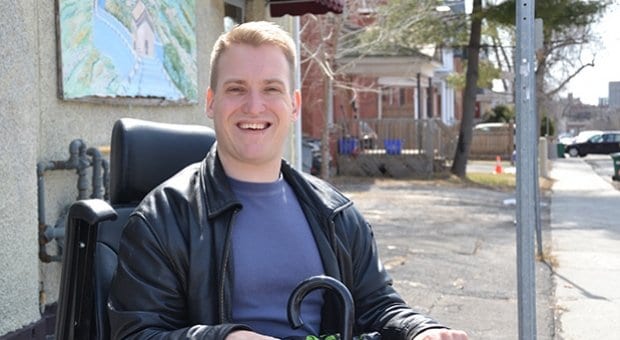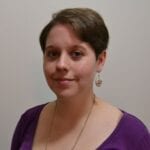If you spend any time in downtown Ottawa, chances are you’re familiar with Nathan Hauch. The 32-year-old, an Ottawa resident since the age of three, is something of a fixture in Centretown, zipping along on his motorized scooter. You may have seen him working out at Plant Bath or navigating the aisles at the Herb and Spice.
Wherever he is, Hauch approaches life with a unique perspective and a keen intellect. The Carleton grad, who has hearing loss and cerebral palsy, makes his living as a public policy coordinator with Spinal Cord Injury Ontario. He’s also self-employed as a researcher and policy analyst, examining how social policies affect people with disabilities. An out gay man and a longtime activist, he’s very involved both politically and socially and has worked with the NDP on queer issues and as a youth coordinator for Pink Triangle Services.
More recently, Hauch added “filmmaker” to his resumé. With his friend Amen Jafri, he produced The City That Fun Forgot? — a documentary exploring Ottawa’s long-standing reputation as a wasteland of boredom and complacency. He’s also working toward a graduate diploma in public policy and is participating in Next Up, a leadership program for young adults sponsored by the Broadbent Institute and the Canadian Centre for Policy Alternatives. He’s a busy guy and someone who has devoted his life to the causes closest to his heart.
“I think people come to activism for different reasons,” Hauch says. He recalls how, at the age of 18, he plugged “how to be an activist” into Alta Vista (a pre-Google search engine). “I thought there was this, like, script one had to follow, but all it really is is just an appetite to want things to be different, to try to listen to other people, to find out where different things work and skills we can contribute. I think the key to making any big change is having a long view of the world.”
Taking the long view is something of a theme with Hauch and something his documentary about Ottawa explores. It’s one thing to identify things in the city that need to change, he says, but quite another to actually effect that change in a concrete way. “There’s often this feeling of, you know, Ottawa is what Ottawa is and very little [tendency] to imagine what it might be elsewhere.”
The documentary explores the need for better urban planning and public transit and more grassroots cultural movements in the city. “I think that we need to have more free things to do in the city to reclaim our public spaces,” Hauch says. “I think that people would like to have a national capital that’s more vibrant that they could come to that would represent their country. But in the documentary, one of the core things that we talk about is that we know what it’s like in Ottawa, but we don’t know what it means to be Ottawans . . . [I’d like to see] Ottawa getting its freak on a bit.”
Changing the city for the better and making it more vibrant is something Hauch feels Ottawa City Council must take an active role in. As someone who is very politically engaged, he’s paying close attention to the events surrounding the upcoming October municipal election. “Talk about the first time having a majority election for a minority community!” he says, referencing the three LGBT candidates (Jeff Morrison, Denis Schryburt and Catherine McKenney) who are vying for the council seat in Somerset Ward. “I’ve definitely seen a lot of leadership in our communities over the past years in different ways; not always queer-specific, but queer people in leadership roles, and it makes sense that they would look to bring that leadership into other forums.”
At the same time, Hauch says he’s much more interested in where the candidates fall on specific issues. “More specifically, not what are the end results, but how are they going to get there? It’s one thing if you say you’re going to make X happen if you’re elected, but you’re one voice around the council table. How do you propose to bring other people around to those ideas? . . . We have to think of ourselves as a ward but also our place in the broader city.”
Carving out a place for himself is something Hauch has a lot of experience with, particularly as someone who experiences an intersection of identities. “I think, in a sense, having a disability almost prepared me for my queer experience.” He says being teased as a child made him realize that it was impossible to please everyone and that he might as well make choices to live the life he wants. He recalls an instance, when he was six years old, where a woman told him he would only ever be a drain on the public system. “There can be that attitude around disability, quite unfortunately, of, you know, where are these people’s contributions? . . . We all contribute to our communities in very different ways.”
For Hauch, a big part of living with a disability is navigating the daily barrage of questions and comments from strangers. “It has to do with certain assumptions that people have about the role that they ascribe to people with disabilities,” he says. “There’s a profound anxiety for a lot of people when it comes to disability . . . It leads to unfortunate entitlement for some people.”
This entitlement can be particularly evident on the bus, already a problematic space for people with disabilities because it’s difficult to get away from situations when they arise. Hauch recalls an incident where a man continually prodded him with questions about what must have happened to him, refusing to drop the matter even after Hauch told him it was none of his business. “Sometimes when you’re up against those types of things there is a tendency to want to self-isolate and not want to deal with it and just remove yourself from an experience where that can happen. But then you don’t really have a full life,” he says. “The only way that really changes is for people who live those experiences and their friends and their supporters to be out in the community to make that happen.”
Ultimately for Hauch, the most important thing is to live authentically — something his experience belonging to multiple minority communities has taught him can be hard-won. “It’s taught me that authenticity is worth it, but it puts up a fight. If you really want to be true to yourself you have to be willing to challenge yourself sometimes when people say no to push forward a bit more.”
For more on Nathan Hauch, see abilityanalysis.ca.
For more on The City That Fun Forgot? and to learn about upcoming screenings, see citythatfunforgot.com.


 Why you can trust Xtra
Why you can trust Xtra


